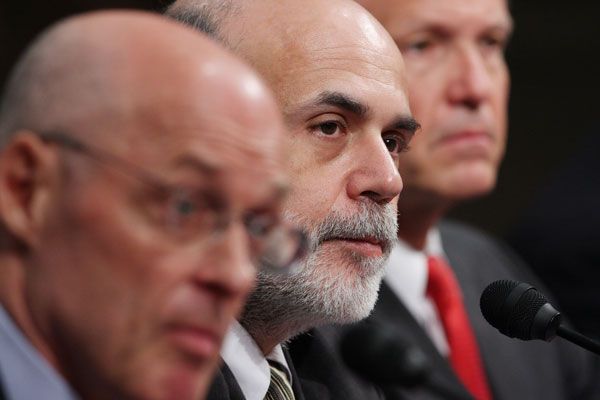Senate Blasts Bush’s Bailout Plan
Jul 31, 2020117.2K Shares2.4M Views
A difficult month for Washington’s financial captains got tougher Tuesday, when Senate lawmakers from both parties grilled Treasury Sec. Henry Paulson Jr. over his $700-billion plan to bail out the ailing finance industry with little oversight and no direct help for homeowners.
Paulson, appearing before the Senate Banking Committee, reiterated requests that Congress accept the White House proposal at face value — and pass it quickly. He pressed lawmakers to “avoid slowing it down with other provisions that are unrelated or don’t have broad support.”
Illustration by: Matt Mahurin
But Senate lawmakers from both sides of the aisle bristled at the idea of granting such a sum — and such authority — on the blind faith that the administration’s strategy would restore investor confidence. Sen. Richard Shelby (Ala.), the highest-ranking Republican on the committee, warned of passing a proposal with little debate and even less proof that it will work.
“I think we need better answers,” Shelby said toward the end of the five-hour hearing. “I don’t believe Congress should just ratify what’s been thrown up at them.”
Some of the senators may have already been looking at an alternative plan. On Monday, Sen. Christopher Dodd (D-Conn.) the chairman of the committee, presented a proposal that includes protections for struggling homeowners as well as stronger oversight of the Treasury Dept.
Perhaps the lawmakers recall another time when Congress surrendered its powers to the Bush administration to confront a national problem. In the wake of the 9/11 attacks, Congress granted broad authority to the White House to conduct its war on terror — a move that effectively sidelined the legislative branch as the Pentagon invaded Iraq. More than five years, 4,100 American deaths and $800 billion later, roughly 145,000 U.S. troops remain entangled in that conflict.
Or maybe lawmakers recall the numerous occasions this year when controversial White House steps to jump-start the struggling economy with taxpayer-funded bailouts were accompanied by similar claims of urgency and necessity. In March, for example, Paulson brokered a buyout of the collapsing Bear Stearns, offering $30 billion in federal leverage to close the deal; earlier this month, he oversaw the government buyout of Fannie Mae and Freddie Mac, the nation’s largest mortgage purchasers, and last week, Paulson approved $85 billion in federal funds to rescue the American International Group, the insurance giant also ensnared in the subprime mortgage crisis.
Acknowledging those efforts, Paulson testified Tuesday that “these steps have been necessary but not sufficient.” Declaring that he has “never been a proponent of intervention,” the former Goldman Sachs CEO nonetheless called on Congress to adopt his bill “quickly and cleanly.”
The lawmakers, however, indicated that they’re approaching the end of their ropes when it comes to entrusting the administration with economic strategies. “How many times can the administration be wrong and still instill confidence?” asked Sen. Robert Menendez (D-N.J.).
Along those lines, the liberal Princeton University economist Paul Krugman warned this weekin his New York Times op-ed column that, because of the sheer scope of the economic downturn, Paulson has no more idea how to fix the mess than any other expert.
“[H]e is a smart guy,” Krugman wrote, “but what, exactly, in the experience of the past year and a half — a period during which Mr. Paulson repeatedly declared the financial crisis ‘contained,’ and then offered a series of unsuccessful fixes — justifies the belief that he knows what he’s doing? He’s making it up as he goes along, just like the rest of us.”
Under Paulson’s plan, the Treasury Dept. would adopt sweeping powers to buy up the toxic, illiquid, mostly mortgage-based assets currently held by the nation’s struggling financial institutions. By thawing Wall Street’s frozen credit markets, Paulson said, Main Street Americans would have better access to the loans they need. “This is not about the companies,” Paulson said. “This is about the American people.”
But committee members Tuesday remained unconvinced.
Many voiced concerns that, by bailing out the finance industry, the White House is helping the very folks who created the crisis. “This massive bailout is not a solution,” said Sen. Jim Bunning (R-Ky.). “It is financial Socialism, and it is un-American … I am frightful,” he added later, “to the point of almost panic.”
“Essentially, what you’re doing is bailing out bad behavior,” said Desmond Lachman, an economist at the conservative American Enterprise Institute.
Sen. Robert Casey (D-Penn.) wondered why Paulson’s plan includes no provisions tackling the foreclosure crisis that most economists — including Paulson — agree is at the root of the current financial meltdown. This exclusion, Casey said, is a “gaping hole” in the proposal.
Housing advocates agree. Jim Carr, chief operating officer at the National Community Reinvestment Coalition, an advocacy group for low-income housing, predicted the bailout will ultimately cost more than $1 trillion. “The reason for that,” he said, “is that it doesn’t solve the problem.”
Many housing groups are pushing for language allowing bankruptcy judges to force lenders to set lower rates for troubled loans — something the finance industry and the Bush administration have long opposed.
Senators also brought up concerns, ignited earlier in the week, that, under the White House plan, the folks charged with deciding who will get help could have close ties to those same companies. “Won’t there be the perception of Wall Street helping Wall Street?” asked Sen. Elizabeth Dole (R-N.C.).
A tired-looking Paulson responded with vague promises of internal oversight.
Dodd was quick to question a provision of the plan that granted the Treasury Dept. blanket immunity from judicial oversight. “This language, in my view, will not last,” Dodd said.
Dodd’s alternative bill certainly omits it. His bill includes bankruptcy protections for struggling homeowners as well as enhanced oversight of the Treasury Dept. It also pushes a controversial provision forcing participating companies to offer stock options to the taxpayers who bailed them out.
Dodd also warned Paulson that Congress will push to include a provision, found in Dodd’s bill, limiting the pay packages for CEOs of companies that receive taxpayer help under the bailout. “Count on it,” Dodd said.
Congressional leaders say they hope to have a compromise worked out by the end of the week. But continued disagreements have also led to concerns that the negotiations could extend into next week, when Congress originally said it would be in recess.
Meanwhile, Wall Street has reacted dismally to the continued negotiations, falling 161 points Tuesday after dropping 372 points a day earlier.

Paula M. Graham
Reviewer
Latest Articles
Popular Articles

